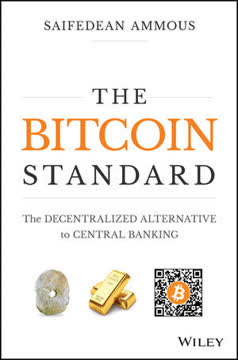Key Takeaways
1. Bitcoin emerged as a revolutionary digital currency, challenging traditional financial systems
"Bitcoin is the first time in five thousand years that we have something better than gold."
A new form of money. Bitcoin, created by the pseudonymous Satoshi Nakamoto in 2009, introduced a decentralized digital currency system that operated without the need for intermediaries like banks or governments. Key features of Bitcoin include:
- Limited supply: Only 21 million bitcoins will ever be created
- Decentralized network: Transactions are verified by a global network of computers
- Blockchain technology: A public ledger that records all transactions transparently
Bitcoin's creation was inspired by the 2008 financial crisis and the perceived failures of traditional banking systems. It aimed to provide a more secure, efficient, and accessible form of money for the digital age.
2. Early adopters and developers shaped Bitcoin's evolution, facing technical and ideological challenges
"I think I understand economics better than most people because I grew up in Argentina. I've seen every single monetary experiment you can imagine."
Ideological roots and technical challenges. Bitcoin's early supporters were often motivated by libertarian ideals and a desire for financial privacy. Key figures in Bitcoin's early development included:
- Hal Finney: One of the first Bitcoin users and developers
- Gavin Andresen: Became lead developer after Satoshi Nakamoto's disappearance
- Martti Malmi: Early contributor who helped create Bitcoin's website and forums
These pioneers faced numerous technical challenges, including:
- Scaling the network to handle more transactions
- Improving security to prevent hacks and theft
- Balancing decentralization with the need for efficient governance
The ideological debates within the Bitcoin community often centered on preserving the original vision of a decentralized, censorship-resistant currency versus adapting to mainstream adoption and regulatory compliance.
3. Bitcoin's rise attracted attention from regulators, investors, and the mainstream media
"It's either going to be worth zero or worth five thousand times what it is today."
Growing mainstream interest. As Bitcoin's price and adoption increased, it began to attract significant attention from various sectors:
Investors and entrepreneurs:
- Winklevoss twins: Early Bitcoin investors who sought to create a Bitcoin ETF
- Barry Silbert: Founder of Digital Currency Group, a major investor in Bitcoin startups
Regulators:
- FinCEN: Issued guidance on virtual currencies in 2013
- New York BitLicense: Proposed regulatory framework for Bitcoin businesses
Media coverage:
- Initially skeptical, focusing on Bitcoin's association with illegal activities
- Gradually shifted to exploring Bitcoin's potential as a disruptive technology
This increased attention brought both opportunities and challenges for Bitcoin, as it struggled to shed its image as a fringe technology and gain legitimacy in the financial world.
4. The dark web and illegal activities posed both opportunities and risks for Bitcoin adoption
"It would be game changing for your business and the Bitcoin industry for FirstMark capital to make an investment in BitInstant."
Silk Road and beyond. The creation of Silk Road, an online black market that used Bitcoin as its primary currency, demonstrated both the power and potential dangers of Bitcoin:
Opportunities:
- Proved Bitcoin's utility for anonymous, borderless transactions
- Attracted early adopters and increased Bitcoin's usage
Risks:
- Associated Bitcoin with illegal activities in the public eye
- Attracted regulatory scrutiny and law enforcement action
The arrest of Silk Road founder Ross Ulbricht and the subsequent shutdown of the marketplace marked a turning point for Bitcoin. It forced the community to grapple with questions of ethics, legality, and the future direction of the technology.
5. Major financial institutions and tech companies began exploring blockchain technology
"We are at the beginning of an exciting time, not just for investors but for all of society."
Blockchain beyond Bitcoin. As Bitcoin gained prominence, traditional financial institutions and tech companies began to explore the potential of its underlying blockchain technology:
Applications being explored:
- Faster, cheaper cross-border payments
- More efficient settlement of financial transactions
- Improved supply chain management and record-keeping
Companies involved:
- JPMorgan: Developed its own blockchain platform, Quorum
- IBM: Launched blockchain services for enterprise clients
- Nasdaq: Explored using blockchain for trading unlisted stocks
This interest from established players helped legitimize blockchain technology, even as some remained skeptical about Bitcoin itself. It also sparked debates about the value of public, permissionless blockchains versus private, permissioned systems.
6. Bitcoin's growing pains included exchange failures, security breaches, and regulatory scrutiny
"The project needs to grow gradually so the software can be strengthened along the way."
Challenges of rapid growth. As Bitcoin's popularity surged, it faced numerous setbacks and challenges:
Exchange failures:
- Mt. Gox: Once the largest Bitcoin exchange, collapsed in 2014 after losing 850,000 bitcoins
- BitInstant: Shut down after its CEO was arrested for money laundering
Security breaches:
- Numerous hacks and thefts of Bitcoin exchanges and wallets
- Highlighted the need for better security practices and user education
Regulatory challenges:
- Varying approaches to Bitcoin regulation across different countries
- Concerns about money laundering, tax evasion, and consumer protection
These issues underscored the growing pains of a nascent technology and the need for more robust infrastructure and best practices in the Bitcoin ecosystem.
7. The future of Bitcoin remains uncertain, with ongoing debates about its scalability and purpose
"Bitcoin forced me to realize I didn't understand money."
Evolving vision and challenges. As Bitcoin matured, debates intensified about its future direction and primary use case:
Competing visions:
- Digital gold: A store of value and hedge against inflation
- Global payment system: A fast, cheap method for transferring value
- Platform for financial innovation: Enabling smart contracts and decentralized applications
Technical challenges:
- Scalability: Increasing transaction throughput without compromising decentralization
- Privacy: Balancing transparency with user privacy concerns
- Governance: Deciding how to implement changes to the Bitcoin protocol
The outcome of these debates and challenges will likely shape the future of Bitcoin and its role in the global financial system. While some see Bitcoin as a revolutionary technology that will transform money and finance, others remain skeptical about its long-term viability and impact.
Last updated:
FAQ
What's Digital Gold about?
- Bitcoin's Origins: Digital Gold by Nathaniel Popper explores the rise of Bitcoin, starting with its creation by the enigmatic Satoshi Nakamoto.
- Key Figures: The book profiles influential individuals like Erik Voorhees, Wences Casares, and the Winklevoss twins, who were pivotal in Bitcoin's development and adoption.
- Impact on Society: It examines Bitcoin's cultural and economic implications, especially in the context of financial crises, and its appeal to a diverse group of supporters.
Why should I read Digital Gold?
- Comprehensive History: The book offers a detailed account of Bitcoin's evolution, essential for understanding the cryptocurrency landscape.
- Engaging Storytelling: Popper's narrative style makes complex topics accessible, weaving personal stories with historical context.
- Insight into Financial Disruption: It provides valuable insights into how Bitcoin challenges traditional financial systems, relevant in today's digital economy.
What are the key takeaways of Digital Gold?
- Decentralization of Money: Bitcoin's role in decentralizing financial power is a central theme, allowing individuals to control their money independently.
- Community and Ideology: The book highlights the diverse motivations of Bitcoin supporters, from libertarians to investors, showcasing the community's complexity.
- Challenges and Risks: It discusses the vulnerabilities Bitcoin faces, such as hacking and regulatory scrutiny, emphasizing the ongoing evolution of cryptocurrencies.
Who is Satoshi Nakamoto and why is he important in Digital Gold?
- Mysterious Creator: Satoshi Nakamoto is the pseudonymous figure who introduced Bitcoin, laying the groundwork for the cryptocurrency revolution.
- Disappearance and Legacy: Satoshi vanished in 2011, leaving behind a decentralized network that thrives, symbolizing Bitcoin's community-driven ethos.
- Ideological Influence: Satoshi's vision of a peer-to-peer electronic cash system shaped Bitcoin's principles of decentralization and trustlessness.
How did Bitcoin gain popularity according to Digital Gold?
- Crisis Response: The 2008 financial crisis created a fertile ground for Bitcoin as an alternative to traditional banking systems.
- Community Building: Early adopters like Erik Voorhees and Roger Ver promoted Bitcoin, fostering a community focused on financial freedom.
- Media Attention: Events like the WikiLeaks blockade and Silk Road's rise brought Bitcoin into the mainstream, attracting new users and investors.
What role did Silk Road play in Bitcoin's development?
- Marketplace for Bitcoin: Silk Road was an online black market using Bitcoin, significantly increasing its use as a medium of exchange.
- Legitimacy and Controversy: While providing a practical application, Silk Road attracted negative attention, complicating Bitcoin's reputation.
- Community Engagement: The site fostered a vibrant community, helping solidify Bitcoin's role in the digital economy.
What challenges did Bitcoin face in its early years according to Digital Gold?
- Regulatory Scrutiny: Bitcoin's decentralized nature clashed with government regulations, posing challenges for early businesses.
- Security Issues: High-profile hacks, like Mt. Gox, raised concerns about the safety of Bitcoin exchanges and wallets.
- Market Volatility: Bitcoin's price fluctuations created uncertainty, complicating its adoption as a stable currency.
How did the collapse of Mt. Gox impact the Bitcoin community?
- Loss of Trust: Mt. Gox's collapse led to a significant loss of trust in Bitcoin, as many users lost their funds.
- Regulatory Backlash: The incident prompted increased scrutiny from regulators, leading to calls for stricter regulations.
- Shift in Focus: The community emphasized security, regulatory compliance, and infrastructure development, contributing to Bitcoin's maturation.
What role did the Winklevoss twins play in the Bitcoin movement?
- Early Investment: The Winklevoss twins were early investors, helping legitimize Bitcoin and attract attention from other investors.
- Advocacy for Regulation: They engaged with regulators to promote a framework for Bitcoin, aiming to address concerns about illegal activities.
- Building Infrastructure: They founded Gemini, a regulated exchange, to provide a secure platform for Bitcoin transactions.
How does Digital Gold illustrate the ideological divide among Bitcoin supporters?
- Libertarian Ideals: Many early adopters viewed Bitcoin as a means to escape government control, aligning with libertarian principles.
- Pragmatic Investors: Others focused on Bitcoin's potential to disrupt financial systems without ideological baggage.
- Community Dynamics: The book highlights tensions between these groups, shaping Bitcoin's direction and perception.
What are the best quotes from Digital Gold and what do they mean?
- “Get rich and change the world.”: Reflects Bitcoin's dual allure of financial gain and revolutionary vision.
- “Grow gradually for strength.”: Emphasizes cautious development to ensure stability and security in disruptive technology.
- “Bitcoin is in its infancy.”: Captures Bitcoin's early stage, highlighting its potential for growth and need for nurturing.
How does Digital Gold address the future of Bitcoin?
- Potential for Growth: The book suggests Bitcoin's technology could revolutionize finance, but challenges remain.
- Community Resilience: Despite setbacks, the Bitcoin community adapts and innovates, indicating a promising future.
- Ongoing Evolution: Bitcoin is in flux, with new developments constantly emerging, showing its story is far from over.
Review Summary
Digital Gold receives mostly positive reviews, praised for its engaging storytelling and comprehensive history of Bitcoin's early days. Readers appreciate the insights into key figures and events shaping the cryptocurrency. Many find it an excellent introduction to Bitcoin, though some desire more technical details. The book's focus on the period up to 2014 is noted as a limitation. Reviewers highlight the book's exploration of Bitcoin's ideological roots and its journey towards mainstream acceptance, while also discussing its challenges and controversies.
Similar Books










Download PDF
Download EPUB
.epub digital book format is ideal for reading ebooks on phones, tablets, and e-readers.





